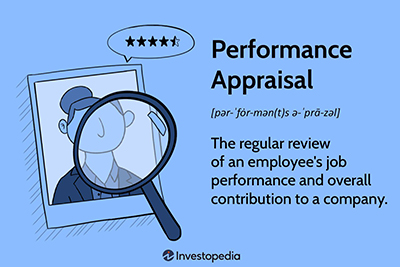Performance appraisal is a formalized and institutionalized form of personnel assessment that focuses specifically on evaluating an employee’s actual job performance over a defined period. Unlike potential assessment, which evaluates future capabilities, performance appraisal concentrates on past and present performance outcomes, behaviors, and goal attainment. It is typically conducted by designated evaluators—such as supervisors—using predefined, agreed-upon performance criteria.
Key Components of Performance Appraisal
In a broad sense, performance appraisal involves a systematic six-step process:
-
Selection of Function(s) – Identifying the primary purpose of the appraisal (e.g., development, compensation, promotion).
-
Determination of the Assessment Procedure – Defining the structure and approach used to carry out the evaluation.
-
Object Specification – Specifying what is to be assessed, such as traits, behaviors, tasks, or goals.
-
Object Representation and Methodology – Choosing how the performance data will be captured and represented.
-
Performance Evaluation (Two Phases):
-
Assessment I: Collection of results, observation of behavior, documentation of performance context, and completion of evaluation forms.
-
Assessment II: In-depth analysis by position, time, situation, and function; includes a performance appraisal interview (→ employee review interview), formulation of judgments, and recommendations for action.
-
-
Follow-Up Conclusions – Drawing insights for the next appraisal period.
In practical business environments, steps 1–4 are often predefined by HR systems and organizational policies.
Core Concept: Actual vs. Desired Performance
The foundational idea of performance appraisal is the comparison between:
-
Actual performance outcomes (observable and measurable)
-
Desired performance expectations (defined by the role or objectives)
The degree of alignment between these two dimensions serves as a key indicator of employee success. If direct outcome measurement is not possible, the assessment focuses on observable performance behavior, comparing actual behavior with expected standards under relevant working conditions.
Types of Performance Appraisal Methods
Performance appraisal systems can be categorized according to various criteria:
-
By structure:
-
Free-form methods vs. structured methods
-
-
By assessment focus:
-
Trait-based, behavior-based, task/activity-based, or goal-oriented
-
-
By appraiser type:
-
Self-assessment, manager/supervisor assessment, peer review, subordinate review, or team-based assessment
-
-
By evaluation approach:
-
Ranking, labeling, classification, task-based scoring, or goal alignment
-
-
By method origin:
-
Psychometric, social-psychological, or business-pragmatic models
-
-
By analytical depth:
-
Summary (global) vs. analytical (criterion-based) evaluations
-






![15 Employee Offboarding Templates That Save Hours of HR Time [Free Downloads] 15 Employee Offboarding Templates That Save Hours of HR Time [Free Downloads]](https://i1.wp.com/www.hrcloud.com/hubfs/Header.png?w=150&resize=150,100&ssl=1)
